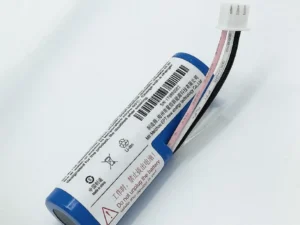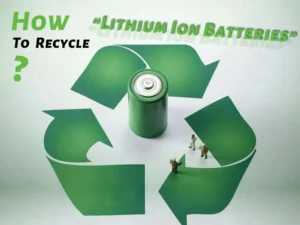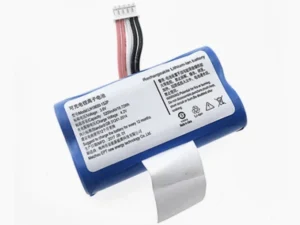Introduction:
The existence of batteries has brought us a lot of conveniences, but at the same time, it has created some distress. Used batteries have long been a problem. Although battery technology has advanced a lot, there are still hazardous materials in some rechargeable lithium ion batteries. Environmental pollution is not the only problem. Poor handling, storage, or disposal can increase the danger of poisoning or fire during the end-of-life stage of any electronic device. But thankfully, lithium ion battery recycling is becoming a more common practice. It’s essential to do your bit with today’s recycling technology. If you are interested in this, start reading!
Why shouldn’t you throw away lithium-ion batteries after use?

Yes, it is a mistake to throw away used lithium-ion batteries, although many people do so. You can’t toss lithium-ion batteries in the regular trash. You can’t even put it in the blue recycling bin! Here are the reasons why you can’t do that.
1. Hazardous to the environment
There are many questions surrounding lithium-ion batteries. For example, some lithium-ion batteries may contain metals that can be very damaging, even if they are only in small amounts. These batteries can leak harmful environmental contaminants such as cobalt and manganese when they end up in landfills. And lithium-ion batteries can light underground fires, which can burn for long periods, contaminating surrounding trash with harmful chemicals. Underground fires can be challenging to spot and may cause large voids in landfills. This may cause flammable electrolytes to be buried even deeper below the ground. Yet, 95% of lithium-ion batteries end up in landfills. This is absurd when you consider that these batteries can be easily removed 90% cobalt and nickel. But luckily, some lithium-ion batteries are replacing cobalt with safer, non-toxic materials like manganese oxide or phosphate.
2. Harmful to humans
In addition to being harmful to the environment, lithium-ion batteries you throw away can be hazardous to human health. You may be worried about the harsh effects of batteries after they end up in landfill. But they are actually harmful even before they are thrown out with curbside trash. Fine particles such as PM10 or PM2.5 may be released by lithium-ion batteries that have been damaged. These particles can contain matter-bound metals such as arsenic and chromium. Dust can get into the respiratory system, causing various health problems, including cardiovascular and respiratory conditions and more. The dangerous gas hydrofluoric acid can be released from lithium-ion batteries. Hydrofluoric acid is a highly corrosive gas that can be inhaled or absorbed through the skin. So it’s worth remembering that you should never attempt to disassemble the lithium-ion batteries!
3. Potential explosions and fires
Although lithium ion batteries are generally safe, unsafe use or damage can cause explosions and fire hazards. Many terrible accidents have long proved this. So be sure to pay attention to the storage and handling of lithium-ion batteries. A charged lithium battery will short-circuit if it is crushed or pierced. This can also cause thermal runoff, which can lead to explosion or combustion. This is one of many challenges that lithium-ion battery recycling faces. It is essential to do this safely because it can lead to the destruction of valuable materials.
4. Contamination of groundwater
Lithium-ion leachates can contain pollutants such as heavy metals, additives, and more. These elements not only make groundwater toxic, but they also alter its properties. And they can also have a deleterious effect on plants and animals.
Are lithium ion batteries recyclable?
The answer is yes. But it is challenging to recycle lithium-ion batteries. Because lithium is flammable, it can be dangerous to recycle. And because of this, lithium ion batteries cannot be added to the regular recycling bin. Cobalt, nickel, and copper are the main components of lithium-ion batteries. Each metal can be recycled or reused. So reusing lithium ion batteries reduces the need to extract new minerals, which is always good for the environment.
How to recycle lithium ion batteries?

We have known that improper handling of lithium-ion batteries or trying to disassemble or recycle them can result in various health and environmental hazards. So what is the correct practice for lithium ion battery recycling? What is certain is that a qualified process of lithium ion battery recycling requires professional and experienced technicians. Also, the cost of recycling lithium ion batteries requires a significant investment. Only if these are guaranteed can we consider starting.
Registered qualified lithium-ion battery recyclers generally choose two processes, pyrometallurgy and hydrometallurgy. The former causes the battery components to melt during high temperatures. This heat burns and separates a mixed-metal alloy. In the latter case, the desired metal is recovered by treating the cathode material with an acidic or alkaline solution. There is also a natural recycling process where materials from used lithium-ion batteries can be reused directly after conditioning. However, as mentioned earlier, either way, what is required is professional knowledge and skills, as well as a stable investment.
The wrong recycling
But no one can guarantee that all waste lithium-ion batteries will be recycled or disposed of in a regulated, safe, and environmentally friendly manner. There are many ways to avoid the official recycling routes for lithium-ion batteries. To make a profit, some people have started to do this. These wrong approaches can lead to pollution at the site, compromising the quality and health of people’s lives. Illegal disposals can also be caused by recycling, which becomes “too costly.” But the implications of doing so are pernicious and can cause severe pollution or unexpected fires. It is also a significant clean-up and remediation cost for the government.
The right way to recycle lithium-ion batteries

Recycling lithium-ion batteries safely is possible only if they are processed by an accredited electric and electronic recycling center.
For individuals:
Individuals can find their nearest electric or electronic recycling center and offer used phones, laptops, and more. They will be accepted and properly recycled. Unfortunately, not all electronic recycling centers accept li-ion batteries. You can contact them by phone or email if you’ve already located the right one.
For businesses:
As a business, there are a large number of batteries that need to be disposed of. This is the right time to contact a recycling center or other organization. Remember to enquire and contact them in advance.
Some reminders on lithium ion battery recycling
1. Don’t toss used lithium-ion batteries in the regular trash. You can’t even put it in the blue recycling bin.
2. Avoid crushing or piercing the lithium ion batteries, as this could cause leakage or short-circuiting.
3. Keep used batteries away from flammable materials.
4. To avoid short-circuiting, keep the batteries in an insulated bag if damaged.
5. To avoid burning, keep them dry and cool.
6. Take the old lithium-ion batteries to a recycling company that is certified to handle any hazardous materials safely.
Conclusion:
There is no doubt that rechargeable lithium ion batteries can be extremely useful. And even more important is the proper and safe handling and recycling. After all, you don’t want to put yourself or others in danger accidentally. If these old batteries are not properly recycled, they could pose severe explosions and fire dangers. After reading this article, you should already know the right way if you want to get rid of an old li-ion battery. If you have used lithium-ion batteries, don’t just throw them away; find a reliable battery recycling center!
